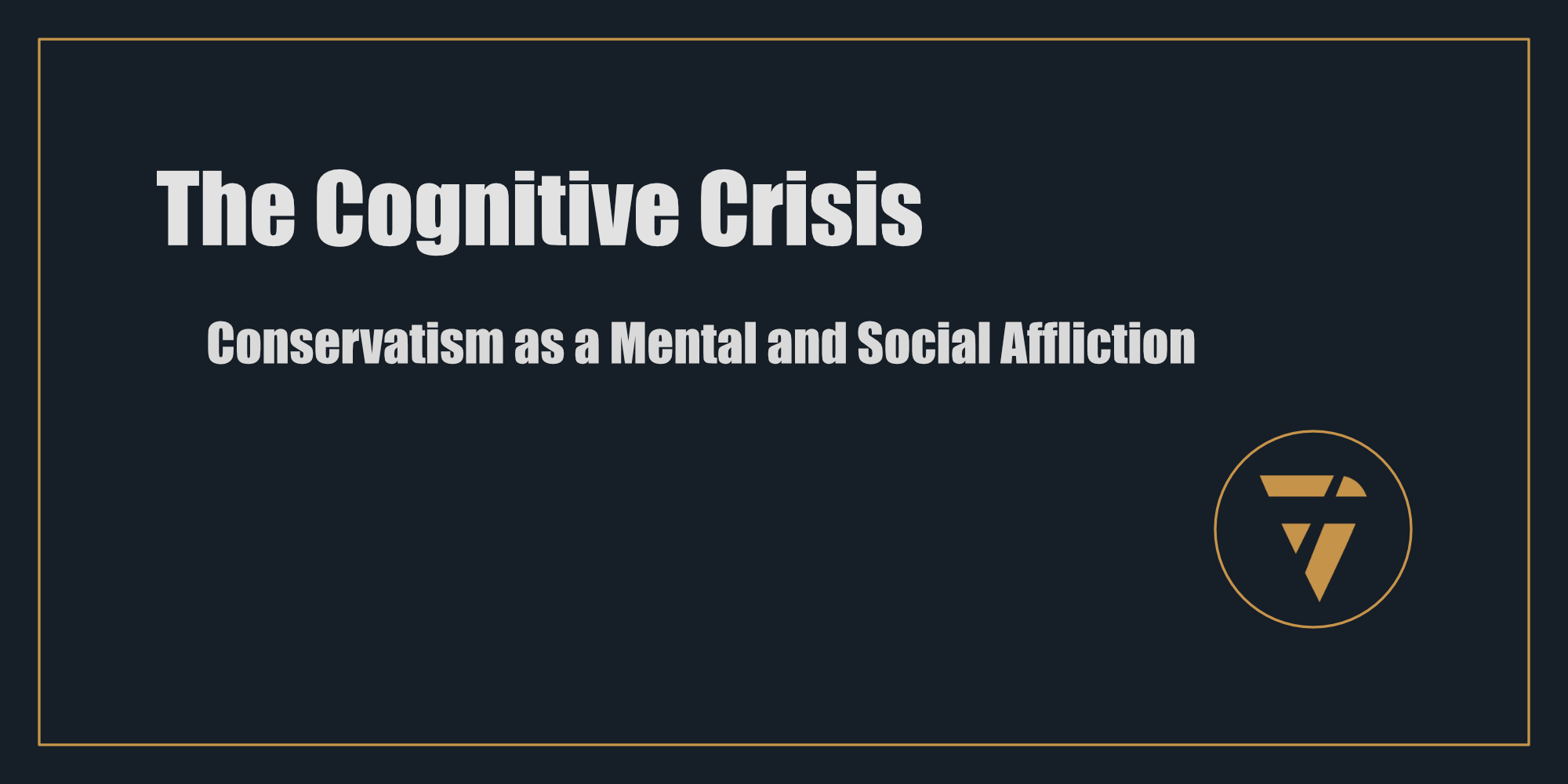The Cognitive Crisis
Conservatism as a Mental and Social Affliction

What if Conservatism Isn’t a Belief, but an Addiction?
Imagine treating modern conservatism the way we approach heroin or fentanyl addiction, with a blend of disdain for its destructiveness and compassion for those trapped by it. What if we viewed it not as a legitimate ideology to debate, but as a societal affliction to diagnose and treat?
Conservatism, particularly in its most extreme religious and authoritarian forms, functions like a drug. It hooks its adherents with the promise of security and belonging, numbs them to empathy, and fuels a destructive dependency on fear, nostalgia, and rigid hierarchy. The symptoms are everywhere: fractured communities, policies that exacerbate inequality, and a global denial of the urgent crises facing humanity.
Yet we continue to argue with its proponents, hoping logic will pierce their defences. What if we’re addressing the problem all wrong?
The Mechanics of Ideological Addiction
Conservatism spreads through the same pathways as any public health crisis:
- Fear as a Gateway Drug: Conservative rhetoric thrives on fear, of change, of “the other,” of progress itself. This fear is intoxicating; it simplifies the complex and gives adherents a false sense of control.
- Gaslighting as a Tool of Dependency: By eroding trust in institutions and objective truth, conservatism isolates its followers. They’re told that the world is against them, and only the ideology can provide salvation.
- Misinformation as a Vector: Social media algorithms, propaganda networks, and echo chambers act as the perfect delivery mechanisms for this addiction, amplifying the most extreme narratives and ensuring continuous exposure.
Conservatism offers its victims the same fleeting relief as any addictive substance, masking pain and uncertainty while compounding the long-term harm.
The Consequences of an Untreated Epidemic
The damage caused by this ideological addiction is not limited to its adherents. Like any unchecked contagion, it spills over into the broader population:
- Economic Injustice: Conservative policies prioritize wealth consolidation over community well-being, leaving millions impoverished while a few prosper.
- Climate Denial: By rejecting science in favour of short-term profits, conservatism accelerates environmental collapse.
- Social Division: Its binary worldview—us versus them—tears apart families, neighbourhoods, and nations.
The conservative condition isn’t just a personal affliction; it’s a public health crisis, with devastating societal costs.
A New Framework: Conservatism as a Disease
If we approached conservatism as an illness rather than a legitimate ideology, our response would shift dramatically:
- Diagnosis: Recognizing the symptoms, cognitive rigidity, moral absolutism, and dependence on authoritarian structures.
- Intervention: Deploying evidence-based strategies to counteract misinformation and fear, much like public health campaigns combat smoking or drug abuse.
- Treatment: Establishing programs to deprogram and rehabilitate those trapped by ideological addiction, offering them a path to recovery and re-integration into society.
This isn’t about punishment or shame. It’s about recognizing conservatism as a condition that distorts thought and behaviour, one that demands empathy and structured support to overcome.
A Society in Recovery
Imagine a future where conservatism is no longer a dominating force, but a relic of our collective past. Here’s what that might look like:
- Empowered Communities: Social safety nets and inclusive policies replace the fear-driven hierarchies of the past.
- A Flourishing Planet: Science-guided decision-making addresses climate change and fosters sustainability.
- A Culture of Empathy: Public discourse prioritizes understanding and collaboration over division and blame.
This vision isn’t utopian; it’s achievable. But it requires us to stop treating conservatism as a legitimate lens for viewing the world, and start addressing it as the destructive and debilitating condition it truly is.
A Call to Action
To heal society, we must shift our perspective. Let’s treat conservatism like the addiction it is, with compassion for its victims, and a firm resolve to dismantle the systems that perpetuate it. This isn’t just about saving individuals, it’s about saving our shared future.
Are we ready to confront this ideological epidemic with the urgency it demands? Are we prepared to rehabilitate a society poisoned by fear and falsehoods?
If you see the parallels between ideological addiction and substance dependency, share your thoughts. Let’s start the conversation that leads to action—and to healing.
Subscribe to stay updated on future insights into societal recovery, and join the movement toward a healthier, more equitable world.
This Substack is reader-supported. To receive new posts and support my work, consider becoming a free or paid subscriber.
This is what I’m working on. Tell me what you think, I enjoy the conversation! Subscribe and follow the work in real time.
Thanks!
B
Conservatism isn’t just an ideology, it’s a cognitive addiction. Fueled by fear, misinformation, and nostalgia, it demands treatment, not debate. Compassion can cure where logic fails.
PS -





